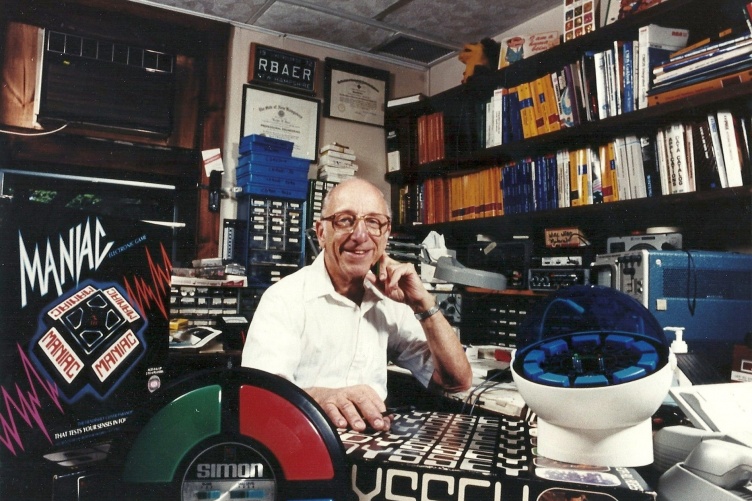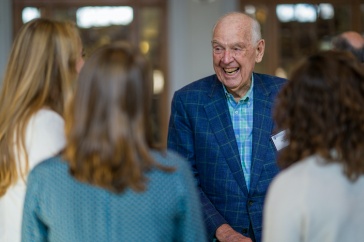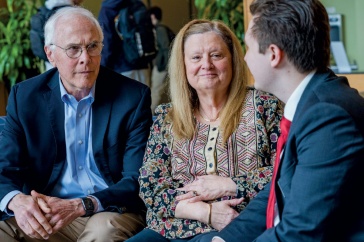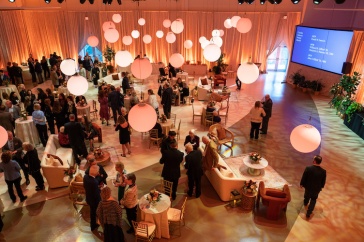
Ralph Baer, seen here in his lab, received the National Medal of Technology and the IEEE Edison Medal, among other awards, and was inducted into the National Inventors Hall of Fame in 2010. PHOTO COURTESY MARK BAER.
There is reason to believe that Mark W. Baer ’88JD and his brother James were the very first children to play the very first video game.
Their father, Ralph H. Baer, is credited with being the inventor and patent-holder of the first system for home video games. Mark recalls sitting at home with his older brother in the late 1960s, goofing around with a gaming prototype plugged into a black and white TV. The simple games they played back then would lead to the $120 billion video gaming industry we know today.
The senior Baer first thought of using televisions interactively in the 1950s while working at a television manufacturing business in New York. A few years passed and the notion evolved, with Baer ultimately sketching out the particulars while waiting for a bus in September 1966. His employer, Sanders Associates (now BAE Systems in Nashua, New Hampshire), supported the plan, and, after years of development and fine-tuning, Baer, his team and Sanders were granted the first video-game patents in 1973. The patents specifically covered products that included any apparatus that would, in combination with a television receiver, generate “dots” on the screen that could be manipulated by the user.
For much of the rest of his five-decade career, Ralph Baer would be a key player and sometimes legal witness in successful efforts against patent infringement attempts by such big names as Atari, Coleco and more. He would be granted some 150 patents for everything from talking doormats to a submarine tracking system to the most successful ever standalone electronic game, the 1980s classic Simon.
To honor his father’s legacy, Mark helped create the Ralph H. Baer Family Patent Scholarship, which supports students with passions similar to his father’s: those studying patent law, ideally with a focus on electronics.
Mark came to UNH Franklin Pierce School of Law following an undergrad career at Bates College, and says attending UNH Law was actually quite a bit of fun — not the typical description for the grueling years it takes to earn a law degree. But at UNH there was a strong sense of camaraderie, he says, adding that the law school held firm to a belief in setting up its students to succeed and prosper.
He spent the majority of his legal career as a prosecutor, including more than 20 years in the Utah (his wife’s home state) state attorney general’s office as a white-collar crime prosecutor, pursuing cases involving multilevel marketing fraud, tax fraud and more.
For Mark, the scholarship at UNH Law is part of his years-long work to honor his father’s legacy in the legal and innovation fields.
“We want to pay it forward to people who will create the new industries, new products and new and better ways of living our lives in the future,” he says.
That promise is evident in this year’s scholarship recipient, Butch Laker, who, having completed a bachelor’s degree in physics, is now pursuing a JD with a concentration in intellectual property. Laker says he is “truly humbled” by the courage that Ralph showed during his career.
“Ralph continued to search for novel ideas and inventions, even after a ‘eureka’ moment that many would have been satisfied with,” says Laker. “I hope to continue Ralph’s legacy by promoting discovery, being inquisitive, and pursuing knowledge, even in the face of adversity.”
An avid supporter of STEM education, Mark sees patent and IP law as a natural extension of STEM disciplines, a crucial means to advancing and protecting innovation. “If we don’t lead as a country, and as a state in New Hampshire, then someone else will pick up that mantle, and then we will be behind the eight ball. My dad impressed that upon me.”
-
Written By:
Michelle Morrissey ’97 | UNH Magazine | michelle.morrissey@unh.edu



















































